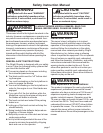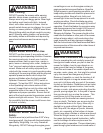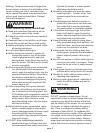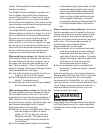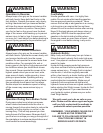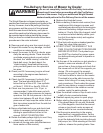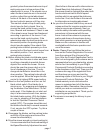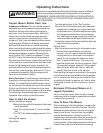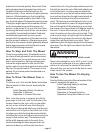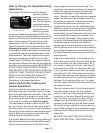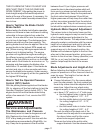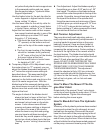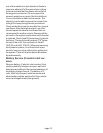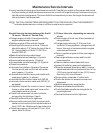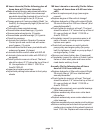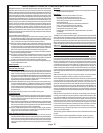
page 10
See manual for further
adjustment required
Speed
Sensitivity
Adjustment
Figure: Decal on side
of Control Console
How to Change the Speed/Sensitivity
Adjustment
The controls are initially set with the Speed/
Sensitivity Adjust-
ment in the slower,
less sensitive posi-
tion. After becoming
completely familiar
with mower operation
the operator may
desire to increase
the ground speed approximately 25-30%. The
faster setting has a corresponding increase in the
sensitivity of the controls. In other words, a given
amount of movement of the control levers will
cause about a 25-30% change in the ground
speed making the controls more sensitive. After
stopping the engine, the adjustment is made by
removing the control rods from the current holes
in the control levers and reinstalling them in the
alternate holes. The holes closest to the control
handle pivot bushings (toward the front of the
mower) are for the slower, less sensitive setting
and the holes farthest from the pivot bushings are
the faster, more sensitive setting. BE SURE THE
“HAIR” PINS IN THE CONTROL ROD ENDS
ARE SECURELY REPLACED EACH TIME YOU
REMOVE THEM. YOU MUST USE NEW "HAIR"
PINS IF THE OLD ONES ARE WORN OR
BENT. You must then perform the Tracking
Adjustment, further described below.
How to Perform the Tracking and
Neutral Adjustment
First ensure that the tire pressure is equal on
both rear drive tires. Drive the mower on a level
parking lot with engine at full throttle. Check that
the mower drives in a straight line when both
hand controls are held to the full speed position.
If not, park the mower and stop the engine.
The adjustment is made by removing the "hair
pin" from one or the other of the swivel ends at
the lower ends of the control rods and screwing
the swivel to either make the control rod longer or
shorter. Before changing the length of the rods
several facts are important to know:
In the faster Speed/Sensitivity setting neither rod
should be shortened so much that at full speed it
pulls its pump control lever (on the sides of the
pumps) against the pump's internal stop. The
pumps have an internal stop that is not designed
to take this type of force and could eventually
cause pump leakage or other damage to the
pump. Therefore, to reach the maximum capable
speed, the rods should be shortened one turn at
a time until you can feel in the hand control that
the internal stop has been contacted, then
lengthen the rod one turn. You will feel the slight
resistance (there is no need to start the engine or
even replace the hair pin while checking this
incrementally, just put the swivel in the hole in the
lever and test it by squeezing the handle to full
fast position). Remember, this procedure does
not apply if the Speed/Sensitivity Adjustment is in
the slower setting, otherwise you'll wind the
swivels way up the rods and the mower will go
fast but will lose most or all of its reverse capabil-
ity and the gap between the stationary bar and
the control levers becomes excessive when at the
neutral position.
If the rod is made shorter it will speed up that
side of the mower and if the rod is made longer
it will slow down that side of the mower. So, if
the mower is tracking to the left, either the left
side needs to go faster (by shortening the rod)
or the right side needs to go slower (by length-
ening the rod). And, if the mower is tracking to
the right either the right side needs to go faster
(by shortening the rod) or the left side needs to
go slower (by lengthening the rod). It is impor-
tant that neither rod should be shortened too far
as mentioned above.
The only reference point to limit the adjustment
from becoming extremely off is the relative
position of the pump internal stop and the sta-
tionary bar in the faster Speed/Sensitivity set-
ting. Therefore, if everything is way off either
because you are installing new parts or other
reasons you should only use the faster Speed/
Sensitivity setting to get the tracking to be accu-
rate and then change to the slower speed range
and tweak the tracking only one or two turns on
either side.
BE SURE THE “HAIR” PINS IN THE SWIVEL
ENDS ARE SECURELY REPLACED EACH



